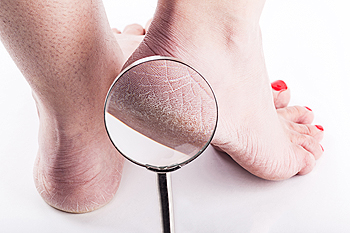
Cracked heels are an uncomfortable foot condition that can develop for various reasons. These can include wearing shoes that do not have a back or standing on hard surfaces for most of the day. Dry skin may also contribute to developing cracked heels and may come from having specific medical conditions. These can include eczema, psoriasis, or hyperkeratosis, which can happen from participating in sporting activities that consistently rub the skin. Additionally, a thyroid disorder may cause the skin to become dry, possibly leading to cracked heels, and it is not uncommon for diabetic patients to have this condition as well. Mild relief may be found when the feet are soaked in warm water, followed by applying a good moisturizer. Wearing cushioned socks may help to protect the heels from rubbing against the shoes. Cracked heels can become infected so it is strongly suggested that you are under the care of a podiatrist who can prescribe medication that can begin effective treatment.
Cracked heels are unsightly and can cause further damage to your shoes and feet. If you have any concerns, contact Howard Abramsohn, DPM from Ambulatory Foot and Ankle Associates, LLC. Our doctor can provide the care you need to keep you pain-free and on your feet.
Cracked Heels
Cracked heels appear unappealing and can make it harder for you walk around in sandals. Aside from looking unpleasant, cracked heels can also tear stockings, socks, and wear out your shoes. There are several methods to help restore a cracked heel and prevent further damage.
How Do You Get Them?
Dry skin is the number one culprit in creating cracked heels. Many athletes, walkers, joggers, and even swimmers suffer from cracked heels. Age and skin oil production play a role to getting cracked heels as well.
Promote Healing
Over the counter medicines can help, especially for those that need instant relief or who suffer from chronic dry feet.
Wear Socks – Wearing socks with medicated creams helps lock in moisture.
Moisturizers – Applying both day and night will help alleviate dryness which causes cracking.
Pumice Stones – These exfoliate and remove dead skin, which allows for smoother moisturizer application and better absorption into the skin.
Change in Diet
Eating healthy with a well-balanced diet will give the skin a fresh and radiant look. Your body responds to the kinds of food you ingest. Omega-3 fatty acids and zinc supplements can also revitalize skin tissue.
Most importantly, seek professional help if unsure how to proceed in treating cracked heels. A podiatrist will help you with any questions or information needed.
If you have any questions, please feel free to contact our office located in Mt Laurel Township, NJ . We offer the newest diagnostic and treatment technologies for all your foot care needs.
